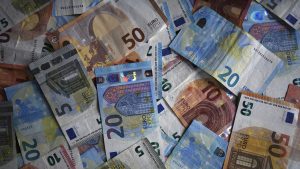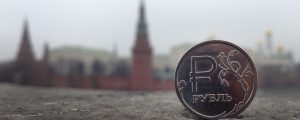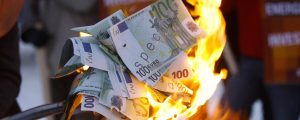While US policymakers are seeking to grab Russia’s sovereign assets altogether, EU officials are planning to find legal ways to seize the profits generated by the assets. Russia has signaled it will retaliate against any form of theft.

An EU official told Reuters that Russian assets frozen in the EU could generate up to €20 billion in after-tax profits through 2027, adding that only part of these profits, as well as a tax on the gross amount, could be sent to the Kiev regime. It was noted the remaining funds, however, would have to stay in the West to create a buffer against Moscow’s retaliation measures.
Of the roughly $282 billion in Russian assets immobilized in Japan and the West, around $207 billion (€191 billion) are held at Euroclear, a clearinghouse based in Belgium.
The official anticipates Euroclear may face a flurry of legal claims from Moscow if Russian money is transferred to Ukraine. The claims are due to come from the Russian Central Bank, which can seize €33 billion in Euroclear funds held in the national securities depository in Moscow as a tit-for-tat move, according to the official.
Russia may also take legal action to seize Euroclear assets held in Hong Kong and Dubai.
Western banks that have lost investment funds in Russia could also sue the clearinghouse, potentially leading to Euroclear’s bankruptcy and triggering a domino effect, given Euroclear’s key role in global financial transactions. The EU official warned that, ultimately, the trail of counterclaims could lead to nothing short of an economic crisis.
 A Russian ruble coin is pictured in front of the Kremlin in central Moscow, on November 6, 2014 – Sputnik International, 1920, 12.03.2024
A Russian ruble coin is pictured in front of the Kremlin in central Moscow, on November 6, 2014 – Sputnik International, 1920, 12.03.2024
Giving Frozen Russian Assets To Ukraine Would ‘Break the Global Financial System’
12 March, 23:20 GMT
Speaking to the Financial Times in mid-February, Lieve Mostrey, chief executive of Euroclear, warned that a G7 plan to use Russia’s frozen assets as a backstop to issue debt for Ukraine, or seize the immobilized assets altogether, could pose serious financial risks to Europe.
“When we come to a logic of seizing of assets (…) then you see the trust in the Euroclear system, the trust in the European capital markets, the trust in euro as a currency substantially affected,” she told FT.
Mostrey remarked that “the risk is a bit lower” if the West grabs profits generated by the frozen sovereign assets.
Russia has underscored it will take retaliatory measures in response to any manipulations with its financial resources illegally immobilized by the West, and that it would perceive any form of grab as “theft”. Euroclear is already facing between 50 and 100 lawsuits in Russian courts over the sanctioned assets.
 Demonstrators burn fake money to protest against a new economic stimulus plan of the government in front of chancellery in Berlin on Monday, Jan.12, 2009 – Sputnik International, 1920, 10.03.2024
Demonstrators burn fake money to protest against a new economic stimulus plan of the government in front of chancellery in Berlin on Monday, Jan.12, 2009 – Sputnik International, 1920, 10.03.2024
Possible Use of Russia’s Frozen Assets by EU ‘Illegal and Foolish’ – French Politician
10 March, 00:31 GMT
Any actions with Russian frozen assets will trigger a symmetrical response, Finance Minister Anton Siluanov told Sputnik in late February, adding that a similar quantity of foreign assets have been frozen in Russia.
The Russian finance minister suggested last December that in the event of confiscation of Russian assets in Europe, Russia may tap foreign funds frozen in so-called Type “C” accounts, a special type of accounts for non-residents introduced by Russia in March 2022.
One cannot withdraw money from these accounts as funds can only be used for a limited range of purposes, such as paying taxes or purchasing federal loan bonds.
According to some estimates, by mid-March 2023, up to 1 trillion rubles (€10 billion) could have been accumulated in type “C” accounts in the form of dividends and coupons paid to investors from unfriendly countries at Russia’s National Settlement Depository (NSD).
Kremlin spokesperson Dmitry Peskov made it clear in early February that Russia is prepared for a decade-long legal battle over the potential seizure of its assets.
“If such decisions are made, they will be deeply illegal. They will have decades-long judicial consequences for those who make these decisions and for those who implement these decisions,” Peskov emphasized.
 Building of Russian Ministry of Finance – Sputnik International, 1920, 12.03.2024
Building of Russian Ministry of Finance – Sputnik International, 1920, 12.03.2024
Foreign Investors Interested in Exchange of Frozen Assets – Russian Finance Ministry
12 March, 13:45 GMT
By Ekaterina Blinova
Originally published by Sputnik Globe on March 13, 2024
Republished by The 21st Century
The views expressed in this article are solely those of the author and do not necessarily reflect the opinions of 21cir.com
